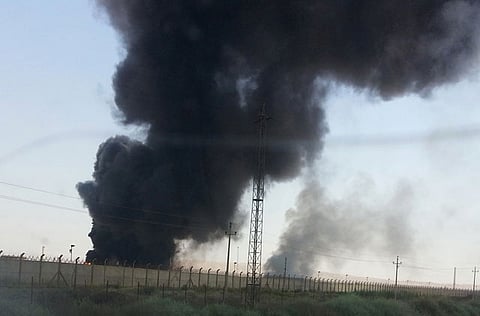Tale of an Iraqi refinery caught in crossfire
This is not the first time the refinery has seen violent circumstances

Today I am writing about a place in my heart which is so much in the news as it is the scene of one of the bigger battles raging in Iraq. The place is Baiji Refinery, which has been contested between the government and its adversaries for more than 10 days now.
It is in my heart because I know how much hard work my colleagues and I put into building it between 1978 and 1984 and completed by later additions in 1987, under very difficult circumstances during the Iraq-Iran war.
The refinery capacity is 290,000 barrels a day across three production lines and two lube oil plants of 125,000 tonnes a year each. Therefore, it is the largest and most complex of Iraq refineries. The place is also the site of a jointly owned Arab company producing chemicals for the detergents industry in addition to being the products pipeline hub to various governorates, including Baghdad.
In the first quarter of this year the refinery was producing close to 140,000 barrels a day of most needed light products such as LPG, gasoline, kerosene and diesel and supplying asphalt and some lubes over and above fuel oil to a nearby power station.
The insurgents surrounded the refinery in the early days of their advance and some reports suggested that they had no intention of going into the refinery provided that it continues operations and distribution to the governorates in accordance with the shares previously established by the Ministry of Oil in Baghdad. However, the Ministry ordered the refinery to be stopped and the battles raged for control without any consideration for the safety of the plant or its operators. Worst, the housing complex was attacked by helicopters and all the staff and families had to flee for safety.
There is no way of underestimating the importance of this refinery to the petroleum product supply-and-demand situation in Iraq. In 2013 and the first quarter of this year, Iraq imported almost 100,000 barrels a day of light products through its southern port at Khor Al Zubair. The loss of the products from Baiji is almost certain to increase imports sharply and it remains to be seen whether makeshift facilities in the south can handle such a situation. Other refineries may be able to increase production marginally, but this is no substitute for Baiji.
A thriving city
In the late 1970s Baiji was just a small town midway between Baghdad and Mosul and devoid of any industry and had very weak services. Today, the refinery, power station, detergents company and an edible oil factory have all turned Baiji into a thriving city with much improved services and facilities. The housing provided by these industrial facilities may run to 3,000 units and the last 600 units were a reward to the refinery in 1984 for its role in supplying products and its operation under less than favourable circumstances.
This is not the first time the refinery has seen violent circumstances. It was attacked by Iranian war planes in 1980 when its first line was under construction and was severely damaged by the American aggression of 1991 and where its staff with the help of others heroically repaired it in record time immediately after the war stopped.
The refinery also suffered during the wars of embargo on Iraq between 1990 and 2003 when it was difficult to secure spare parts, catalysts and chemicals for its operations due to lack of funds as well as the embargo.
Only recently the refinery expanded its gasoline processing facilities to be able to produce non-leaded gasoline and also started generating its own power with many more projects on its schedule.
But this time around the conflict is different. You cannot have a civil war inside a refinery and fears are growing that the fighting may destroy what once was the pride of all Iraqis, especially those who had a role in its development and operations over the years. The refinery cost may have been over $2 billion but its replacement may run to $12 billion by today’s standards and much more by the latest indicators in Iraq.
I have just published my book in Arabic, mostly about my education and my work in the Iraqi oil industry. Almost a third of the book rightly relates to the Baiji Refinery and its evolution, and it saddens me to fear so much for its future. I salute the management and staff and wish them and their families safety.
— The writer is former head of the Energy Studies Department at the Opec Secretariat in Vienna.



